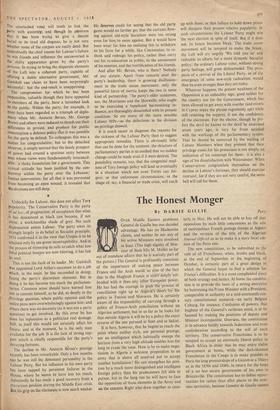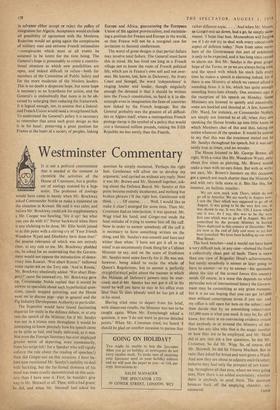The Honest Monger
Paris
By DARSIE GILLIE OVER Middle Eastern problems General de Gaulle has one decided advantage. He has no Hashemite clients, and neither he nor any of his active Ministers were involved in Suez. (The high dignity of Min- ister of State lifts M. Mollet so far out of mundane affairs that he is scarcely part of the picture.) The General is profoundly conscious of the importance of making peace between France and the Arab world,' as also of the fact that in the Maghreb FranCe is More' deeply em- broiled with it than any other 'European fibwer. He has had the courage to push 'ffie 'process of conciliation right up to Algeria's' &Mrs "by his policy in Tunisia and Morocco. He is certainly aware of the impossibility of carrying through a policy of Franco-Arab conciliation without an Algerian settlement, but in so far as he looks for that outside Algeria it will be by a policy the exact reverse of the one pursued at Suez and at Sakiet.
It is here, howeveri that he begins to reach the point where neither style, nor personal prestige, nor an intelligence which habitually sweeps the horizon from a very high altitude enables him for long to evade the issue. How is he to make nego- tiation in Algeria a welcome proposition to an army that is above all resolved not to accept another humiliation? He can strengthen his posi- tion by a much more distinguished and intelligent foreign policy than his predecessors felt able to pursue, but in the long run he will have to face the opposition of those elements in the Army and on the extreme Right who drew together so sinis- terly in May. He will not be able to buy of that opposition by such little concessions as the sale of metropolitan French postage stamps at Algiers and the revision of the title of the Algerian Journal Offieiel so as to make it a mere local edi- tion of the Paris one.
The new constitution, to be submitted to the vote of all Frenchmen, white, broWn and black, at the end of September or the beginning of October, is certainly part of a great design in which the General hopes to find a solution for France's difficulties. It is a most complicated piece of both strategy and tactics. At home the constitu- tion is to provide the basis of a strong executive by buttressing the Prime Minister with a President, comparable in authority to a mid-nineteenth-cen- tury constitutional monarch—an early Belgian Coburg, for instance. Confusion of powers, that bugbear of the General's cartesian mind, is to be banned by making the positions of deputy and Minister incompatible. Overseas, the constitution is to advance boldly towards federation and even confederation according to the will of each territory. The conservative Frenchman is to be tempted to accept an extremely liberal policy in Black Africa in order that he may enjoy stable government at home, while the dark-skinned Frenchman in the Congo is to make possible in Paris the long premierships of a Guizot or a Thiers as in the 1830s and 1840s, in return for the hope of a no less secure government of his own in Brazzaville. The constitution has to define oppor- tunities for rather than allot places to the over- seas territories, because General de Gaulle cannot in advance either accept or reject the policy of integration for Algeria. Acceptance would exclude all possibility of agreement with the Moslems. Rejection would set going again the conspiracies of military men and extreme French nationalists —conspiracies which must at all events be assumed to be latent for the time being. The General's hope is presumably to create a constitu- tional situation in which new possibilities are open, and indeed difficult to refuse—both for members of the Committee of Public Safety and for the more moderate of the Moslem leaders. This is no doubt a desperate hope, but some hope is necessary as an hypothesis for action, and the General's is undoubtedly that more is to be ob- tained by enlarging than reducing the framework. It is logical enough, too, to assume that a federal- ised French Union would need a strengthened hub. To understand the General's policy it is necessary to remember that some such great design as this is in his head : preserving a great position for France at the heart of a society of peoples, linking Europe and Africa, guaranteeing the European Union of Six against provincialism, and maintain- ing a position for France and Europe in the world, so that France will not be a marginal case for invitation to Summit conferences.
The worst of great designs is that partial failure may involve total failure. The General must have this in mind. He has lived too long in a French village not to know the roots of French political life, which are in France's own soil and not over- seas. He knows, too, how in Dahomey, the Ivory Coast and Senegal, the word 'independence' is ringing louder and louder, though singularly enough the demand is that it should be written into the French constitution, so hard is it to dis- entangle even in imagination the fates of countries now linked by the French language. But the General probably sees the greatest of all difficul- ties in Algiers itself, where a metropolitan French postage stamp is the sythbol of a policy that would cost a thousand million pounds, ruining the Fifth Republic no less surely than the Fourth.































 Previous page
Previous page